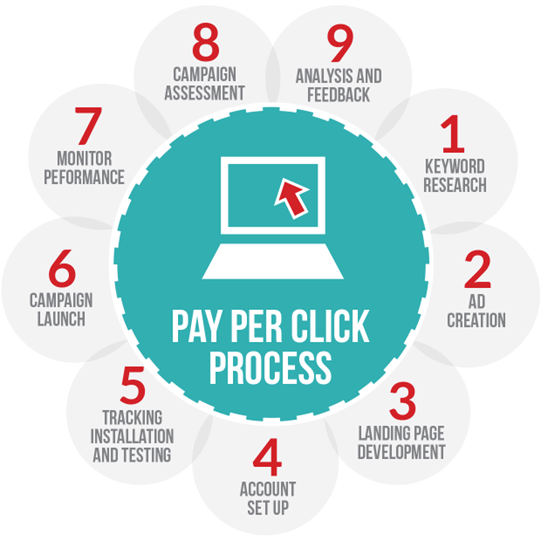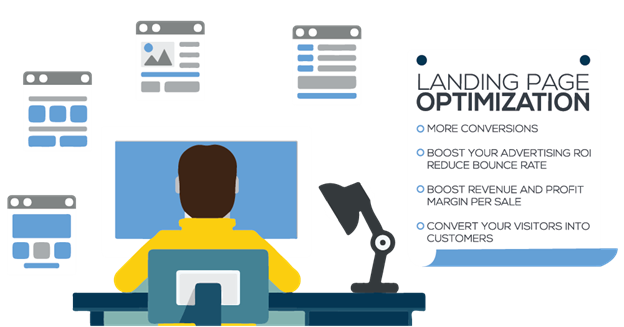SHARE

Pay-per-click (PPC) advertising can be a highly effective tool for businesses looking to increase their online visibility and drive targeted website traffic. However, without proper optimisation, PPC campaigns can quickly become a drain on your budget, yielding minimal results. In this article, we will explore the key strategies and best practices you can employ to optimise your PPC advertising campaigns for maximum return on investment (ROI).
[thrive_leads id=’3729′]
Understanding the Basics of PPC Advertising
Before diving into the optimisation strategies, it’s crucial to have a solid understanding of what PPC advertising is all about. PPC advertising, short for Pay-Per-Click advertising, is a model in which advertisers pay a fee each time one of their ads is clicked. These ads are displayed on search engine results pages (SERPs) and websites, and they can be highly targeted, allowing you to reach your ideal audience. The key to successful PPC advertising lies in creating relevant and compelling ads that engage users and entice them to click.
PPC advertising has become an integral part of online marketing, revolutionising the way businesses promote their products and services. It offers a cost-effective way to drive targeted traffic to your website, helping you increase brand visibility and generate leads. By leveraging the power of search engines and carefully selecting keywords, businesses can position themselves in front of potential customers at the exact moment they are searching for a specific product or service.
What is PPC Advertising?
PPC advertising, also known as paid search advertising, is a marketing strategy in which businesses bid for the placement of their ads on search engine result pages (SERPs). When a user enters a search query that matches the keywords you have chosen for your campaign, your ad has the potential to appear above or below the organic search results.
Let’s delve deeper into how PPC advertising works. When setting up a PPC campaign, advertisers select a list of keywords that are relevant to their business. These keywords act as triggers, determining when and where their ads will be displayed. The bidding process comes into play when multiple advertisers want their ads to appear for the same keyword. Advertisers bid on the keywords they want to target, specifying the maximum amount they are willing to pay for a click. The search engine then determines the ad’s position based on the bid amount and other factors such as ad quality and relevance.
It’s important to note that PPC advertising operates on an auction-based system, meaning that the highest bidder doesn’t always win the top spot. Search engines also take into account the quality and relevance of the ad to ensure that users are presented with the most useful and engaging content.
The Importance of PPC Advertising for Businesses
PPC advertising offers several benefits for businesses. Firstly, it allows you to target your ads to a specific audience based on factors such as location, demographics, and search intent. This ensures that your ads are only shown to users who are likely to be interested in your products or services, maximising your chances of generating quality leads and conversions.
Furthermore, PPC advertising provides businesses with valuable insights and data that can be used to optimise their marketing efforts. Through detailed analytics and tracking tools, advertisers can measure the performance of their campaigns, identify areas for improvement, and make data-driven decisions to enhance their overall marketing strategy.
Another advantage of PPC advertising is its flexibility and scalability. Unlike traditional advertising methods, PPC allows you to set your budget and adjust it as needed. This means that businesses of all sizes can participate in PPC advertising, regardless of their marketing budget. Additionally, PPC campaigns can be launched and modified quickly, providing businesses with the agility to respond to market trends and adjust their strategies accordingly.
Lastly, PPC advertising provides faster results compared to other marketing channels, allowing you to quickly test and optimise your campaigns for better performance. By analysing the data and metrics provided by the PPC platform, businesses can make informed decisions to improve their ad copy, landing pages, and targeting, ultimately driving higher conversion rates and return on investment.
PPC advertising is a powerful tool that can help businesses reach their target audience, increase brand visibility, and drive valuable traffic to their websites. By understanding the basics of PPC advertising and implementing effective strategies, businesses can leverage this marketing channel to achieve their goals and stay ahead of the competition.
Key Elements of a Successful PPC Campaign
Optimising your PPC campaigns requires careful attention to detail across several key elements. By focusing on these areas, you can create campaigns that are highly relevant, engaging, and likely to drive conversions.
Choosing the Right Keywords
Keywords are the foundation of any successful PPC campaign. It’s important to select keywords that are highly relevant to your business and have sufficient search volume. Conducting keyword research can help you identify the most valuable keywords for your campaign. Consider the search intent behind each keyword and choose keywords that align with the goals of your campaign.
Writing Compelling Ad Copy
Your ad copy is crucial in enticing users to click on your ads. Make sure your ad copy is clear and concise and highlights the unique selling points of your products or services. Use compelling language to capture the attention of your target audience and encourage them to take action.
Landing Page Optimisation
Once a user clicks on your ad, the landing page they are directed to should provide a seamless and relevant user experience. Ensure that your landing page is visually appealing, loads quickly, and delivers on the promise made in your ad. Use persuasive copy and clear call-to-action buttons to guide users towards conversion.
Strategies for Maximising your PPC ROI
It’s important to continuously review and adjust your strategies based on data-driven insights to optimise your PPC campaigns and achieve maximum ROI. Here are some strategies to consider:
Regularly Reviewing and Adjusting your Bids
Bidding on the right keywords at the right time is critical for success in PPC advertising. Regularly review your bids and adjust them based on keyword performance, ad position, and budget. To ensure optimal performance, use bidding strategies offered by PPC platforms, such as automated bid strategies.
Utilising Ad Extensions Effectively
Ad extensions are additional pieces of information that can enhance your PPC ads and provide users with more reasons to click. These extensions can include phone numbers, links to specific pages on your website, additional text, and more. By utilising ad extensions effectively, you can increase the visibility and relevance of your ads, leading to higher click-through rates and conversions.
Targeting your Ads to the Right Audience
PPC platforms offer various targeting options to help you reach your ideal audience. Use targeting options such as geolocation, demographics, and interests to ensure that your ads are shown to people most likely to be interested in your offerings. This maximises your chances of driving conversions and helps you minimise wasted ad spend.
Measuring the Success of your PPC Campaigns
Tracking the performance of your PPC campaigns is essential for understanding the effectiveness of your strategies and making data-driven optimisations. Here are some key metrics to monitor:
Understanding PPC Metrics
PPC metrics, such as click-through rate (CTR), conversion rate, and cost per conversion, provide insights into the performance of your ads. By analysing these metrics, you can identify areas for improvement and optimise your campaigns accordingly.
Tracking Conversions and ROI
Setting up conversion tracking allows you to measure the number of leads or sales generated from your PPC campaigns. This data will help you determine the true ROI of your advertising efforts and identify which keywords, ads, or landing pages are driving the most valuable results.
Mistakes to Avoid in PPC Advertising
While optimising your PPC campaigns, it’s important to be aware of common mistakes that can hinder your success. Avoiding these pitfalls will ensure that your campaigns remain on track and yield the best possible results.
Ignoring Negative Keywords
Negative keywords are keywords for which you explicitly do not want your ads to be shown. Failure to identify and include relevant negative keywords can result in wasted ad spend and low-quality clicks. Review your search term reports regularly and add negative keywords to prevent your ads from appearing in irrelevant searches.
Overlooking Mobile Users
Optimising your PPC campaigns for mobile devices is crucial in today’s mobile-centric world. Ensure that your landing pages are mobile-friendly, your ads are tailored for mobile users, and your overall user experience is seamless across devices. Ignoring mobile users can lead to missed opportunities and decreased ROI.
Not testing different ad variations
In PPC advertising, testing is key. A/B testing different ad variations, such as different headlines, descriptions, or calls-to-action, can help you identify what resonates best with your target audience. Continuously test and optimise your ads to improve their performance and increase your ROI.
Following these strategies and avoiding common mistakes can optimise your PPC advertising campaigns for maximum ROI. Remember to regularly review and adjust your campaigns based on data-driven insights, keep an eye on key metrics, and continuously test and optimise your ad variations. With a well-optimised PPC campaign, you can drive targeted traffic to your website, generate high-quality leads, and ultimately, grow your business.
Frequently Asked Questions About PPC Advertising Campaign for Maximum ROI
What is ROI in advertising?
ROI is the ratio of your net profit to your total costs. When calculating the ROI from your PPC campaigns, consider all expenses in your total cost, including Ad spending, Which includes the costs of advertising on Google Ads, Facebook, or any other search engine or social media platform.
What is a good ROI for PPC Campaign?
A “good” ROI for a PPC campaign can vary greatly depending on the industry, the specific business, and the goals of the campaign. However, a positive ROI, where the revenue generated from the campaign exceeds the cost of the campaign, is generally considered good.
Which marketing has the highest ROI?
The marketing channels that produce the highest ROI are search, paid, and email. These digital or online channels include strategies like email marketing, search engine optimisation (SEO), and pay-per-click (PPC) advertising.
How to increase ROI in advertising?
- Measure the effectiveness of core metrics
- Experiment with different marketing channels
- Implement A/B testing across all campaigns
- Focus on your ad spend and income
- Conduct market research to understand your target audience
- Personalise your marketing to improve ROI
How do you calculate ROI?
The basic ROI calculation is straightforward: You take the value of your investment, subtract its cost and then divide it by the cost of the investment. In simpler terms, you take the change in your revenue after your marketing campaign has been deployed, subtract how much you spent on it, and then divide that cost by that cost.














